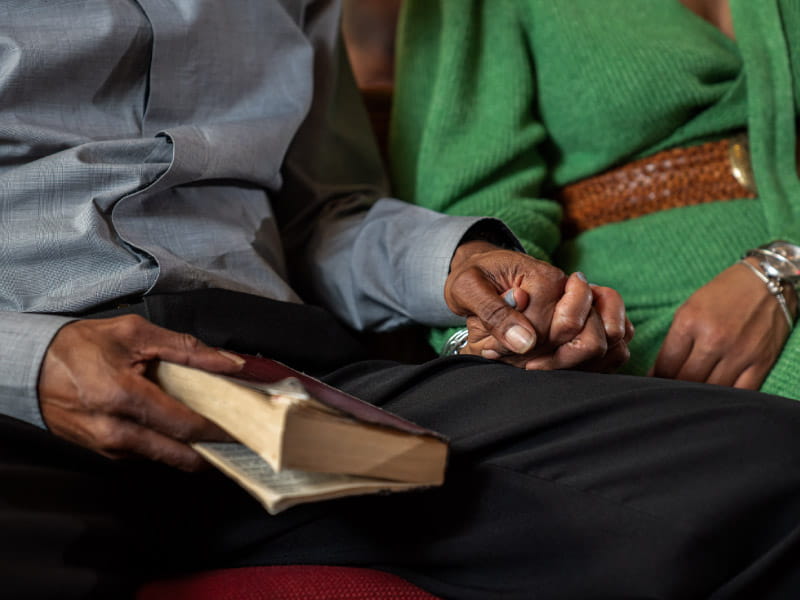For Black churchgoers in New Orleans, religious beliefs may influence health behaviors
By Laura Williamson, American Heart Association News

Members of Black churches in New Orleans who believe religion plays an important role in their health may be more likely to eat fruits and vegetables, be physically active and have confidence asking questions of health care providers than their peers who don't share that belief, new research finds.
The research, presented Tuesday at the American Heart Association's Epidemiology, Prevention, Lifestyle and Cardiometabolic Health conference in Boston, highlights the potential role Black churches may play in improving cardiovascular and other chronic health conditions among communities facing a disproportionately higher risk. The findings are considered preliminary until full results are published in a peer-reviewed journal.
"There has been a lot of study showing there is a protective relationship between religious activities, such as attending church, and better health," said lead study author Farah Allouch, a doctoral student in the department of epidemiology at Tulane University's School of Public Health and Tropical Medicine in New Orleans. "What we add is the mechanism of how that happens."
Heart disease is the leading cause of death in the U.S. As of 2020, nearly 60% of all Black adults experience some type of cardiovascular disease, according to AHA's statistical update published in January. They also are substantially less likely to achieve the lifestyle behaviors and health factors that help prevent cardiovascular diseases. These include getting sufficient physical activity, maintaining a healthy weight, not smoking, managing blood pressure and eating a healthy diet. Structural racism and other systemic and historical inequities have been shown to play a role in these disparities.
Because of the influential role Black churches play in people's lives, prior research suggests they may have the ability to help erase some of these disparities. The new study explored how.
CHERISH, the Church-based Health Intervention to Eliminate Racial Inequalities in Cardiovascular Health study, seeks to improve cardiovascular health among members of predominantly Black churches in New Orleans. It began with a pilot study that included a self-administered needs assessment survey taken by 302 members of 13 churches between November 2021 and February 2022. Participants were 77% female and 99% Black, with a median age of 66.
The perceived religious influence on health was measured by how strongly a person agreed or disagreed with two statements: "Religious beliefs have great influence on my health" and "I tend to avoid behaviors harmful to my body because of my religious beliefs." Participants also answered questions about their health behaviors, such as whether they ate fruits and vegetables daily, engaged in physical activity or used tobacco or nicotine products. And they self-reported whether they had high blood pressure, high cholesterol or diabetes.
Participants also were asked how strongly they agreed or disagreed with statements about their confidence level in asking questions of health care professionals and understanding medical treatment plans.
Those who strongly agreed that religious beliefs had an important influence on their health were 64% more likely to eat fruits and vegetables each day and 76% more likely to engage in physical activity, compared to those who disagreed or strongly disagreed. They also reported being substantially more confident about asking questions of health care professionals, though not more confident in understanding treatment plans.
Despite reporting better health behaviors, church members in the analysis showed no association between their religious beliefs and their health outcomes, such as blood pressure or cholesterol levels.
The findings nonetheless suggest an important role for Black churches in helping to erase health care disparities, said Dr. LaPrincess Brewer, a cardiologist and assistant professor of medicine at the Mayo Clinic College of Medicine in Rochester, Minnesota. She also is a founding director of the Fostering African-American Improvement in Total Health, or FAITH!, a community-based research model for people living in under-resourced areas.
"Evidence from studies like CHERISH support the crucial role churches play in advancing cardiovascular health equity," said Brewer, who was not involved in the new research but led a study published last year in the Journal of the American Heart Association that concluded regular church attendance might expose a person to messaging about health and wellness that could influence health behaviors.
The new study reinforces that idea, Brewer said. It suggests "incorporating health messaging in sermons and other worship services that emphasize unhealthy habits to avoid may provide a strong motive for churchgoers to adopt healthy lifestyles," she said. "Also, the finding that religiosity may positively influence confidence in asking questions to health care professionals provides evidence supporting the churches' role in improving the quality of patient care by fostering more individualized care, patient health literacy and the patient-clinician relationship."
Katherine T. Mills, an associate professor and vice chair of epidemiology at Tulane University School of Public Health and Tropical Medicine, said the findings of the pilot study would help inform a larger study that would test interventions to reduce cardiovascular risk factors among congregants. The findings suggest "we should really link spirituality to the interventions," said Mills, who is the study's co-principal investigator.
Interventions that could be carried out through the church include blood pressure screenings, linking people to primary care services and providing coaching and education programs on healthier eating and ways to increase physical activity, Mills said.
"We are hoping to expand upon existing health ministry activities," she said. "If we meet people where they are, we may be able to have an impact on cardiovascular health in this population."
If you have questions or comments about this American Heart Association News story, please email [email protected].





